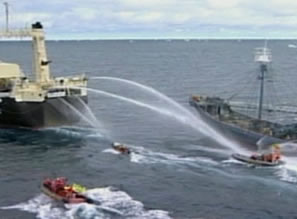Anti-whalers deny Japan's scam to restart commercial whaling
May 29, 2007
Anchorage, Alaska - Anti-whaling countries have rejected a plan which could have seen Japan scale back its Antarctic hunting program in exchange for its return to commercial whaling.

Japan had said it would consider scrapping plans to include humpback whales in the catch in return for limited commercial hunting by four coastal communities.
But anti-whaling countries at the annual meeting of the International Whaling Commission rejected the move as "needless act of provocation".
The IWC meeting opened in Alaska on Monday.
Clear rejection
The proposed humpback hunt has been a major issue in anti-whaling countries, notably Australia and New Zealand which both run healthy whale-watching industries with humpbacks as their star turn.
Japan plans to add 50 humpbacks next season to its annual Antarctic hunt, which it runs under regulations permitting whaling for scientific research.
The hunt currently takes minke and fin whales.
Speaking to reporters immediately before the meeting opened, Japan's deputy whaling commissioner Joji Morishita stopped short of offering a formal deal, but hinted at progress behind the scenes.
"We are open-minded for dialogue (on the humpback question), and we might come up with a big package which will satisfy all members," he said.
"But we are very keen to see our small-type coastal whaling proposal progress."
This proposal would entitle four coastal communities to take a small number of minke whales. The same number of minkes would be deducted from the current self-awarded coastal scientific quota.
But the Japanese plan was rejected in no uncertain terms by an anti-whaling bloc including the US, the UK and Australia.
"The inclusion of the humpback whale is a highly provocative act," said Australia Environment Minister Malcolm Turnbull.
"It is calculated... to undermine dramatically the standing, the affection, the relationship between the Australian and the Japanese people. It is a needless act of provocation."
The delegates said the Japanese plan amounted to commercial whaling, which has been banned for 21 years under a global IWC moratorium.
Problem quotas
Indigenous hunts appear likely to cause some major headaches on the meeting's second day. Aboriginal, or subsistence, permits are given to groups judged to have a strong whaling history and a need for whale meat. They are awarded in five-year blocs, and are up for review in Anchorage.
Greenland wants to expand the scale of its indigenous hunt, and include humpbacks and bowhead whales for the first time. With much of the meat being sold, there are concerns that it is coming too close to being a commercial endeavour.
Russia also asked for additional quotas for its Chukotka region.
But the US is desperate to renew quotas for its own indigenous groups here in Alaska, and may find it politically difficult, with its anti-whaling allies, to oppose the Greenland bid.
"There's a lot of discussion going on with Greenland and others to see if we can reach some compromise that we could support," said US whaling commissioner Bill Hogarth.
"We realise it's important to Greenland, but you have to be careful of the species you take, and whether you have scientific justification," he told BBC News.
Latin American countries are said to be particularly riled by the bids, particularly as they feel that Russia and Denmark (which speaks for Greenland) have consistently opposed plans for a whale sanctuary in the south Atlantic.
Meeting of minds?
Last year the pro-whaling camp enjoyed its first triumph in 20 years with the passing, by a single vote, of a motion calling for the eventual resumption of commercial whaling.
The moratorium itself will not be lifted in the foreseeable future, as it would require a three-quarters majority of votes.
In any case, this year the balance of power has shifted, with new members such as Croatia, Cyprus, Ecuador, Greece and Slovenia weighing in on the anti-whaling side, against only Laos as a probable new pro-whaling country.
In recent years, the IWC has been riven by a fundamental divide between the two camps, its meetings marked by emotional and often aggressive language.
Preliminary exchanges here have been in a much more conciliatory spirit, with delegates on both sides talking of finding common ground.
But Japan will be tabling a strong resolution against the Sea Shepherd Conservation Society, which disrupted Japan's Antarctic hunt in the 2006-7 season, holing one vessel and engaging in what Mr Morishita called "very violent activities".
BBC News
| 
